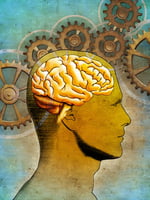Functional magnetic brain imaging (fMRI) of preschool-age children appears to be useful in...
Brain Imaging During Memory Task May Predict Response to Antidepressant
 |
Scopolamine, better known as a treatment for motion sickness, has been under study since its fast-acting antidepressant properties were first reported in 2006. But not all patients respond. So Maura Furey, Ph.D., and colleagues developed a strategy for identifying patients likely to respond to the drug. The acetylcholine system, on which scopolamine works, plays a pivotal role in working memory by influencing the processing of information through the visual cortex. Furey and colleagues hypothesized that depressed patients would show aberrant visual cortex activity in response to a working-memory task; they also expected to find that patients with more dysfunctional acetylcholine systems would respond better to scopolamine treatment.
In their study, depressed patients and healthy subjects performed a working-memory task while brain activity in the visual cortex was monitored via MRI; the subjects then received either placebo or scopolamine. The researchers’ hypothesis proved correct: scopolamine treatment reduced depression symptoms by 63%, and the strength of this response correlated significantly with visual cortex activity. “We have discovered a potential neuroimaging biomarker that may eventually help to personalize treatment selection by revealing brain-based differences between patients," explained Furey.
Read an abstract of the study here. For more information about how brain imaging may predict treatment response in mental illness, see Psychiatric News here.





